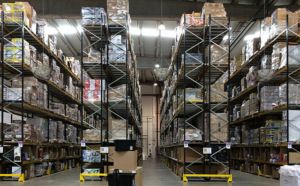News
Business News in Brief: Wupti! Danish supermarket picks up Amazon’s gauntlet
This article is more than 8 years old.
Danish/Spanish agree sausage skin joint venture, fish factory moves to Poland and a success story for robot companies in Odense

Watch out Denmark! Amazon is coming (photo: Álvaro Ibáñez)
In France and Germany, 30 percent of all internet business goes through Amazon. If nothing is done, the same thing will happen in Denmark, according to the Dansk Supermarked Group. According to the group, the solution is to transform the Wupti webshop into a one-stop shop through which all Danish internet businesses can operate. Kenneth Nielsen, the e-business chief at Dansk Supermarked Group, told Børsen: “We can co-operate and compete at the same time. I don’t think we have much choice, because Amazon is coming and the Danish webshops have to be ready. We hope this is the way to do it.”
Fish factory in Fredericia moves to Poland
Fishery concern A Espersen announced on Monday that it is closing its production in Fredericia and moving production to Poland, Fyns Stiftstidende reports. Administrative director Klaus Nielsen explained that lower wages in Poland were the reason that the production of ready meals was moving. “The production of this type of food is very labour-intensive and we’ve not been able to optimise production so that it could be profitable. That’s why we’ve made the decision to move to Poland, where we already have a factory.” Last week, A Espersen published its accounts for 2016, which showed a turnover of 2.3 billion kroner and losses of 35 million kroner. This is the third year in succession that the concern has been in the red.
Success story for Odense Robotics cluster
Two companies nurtured under the wing of Odense Robotics are now ready to make their own way in the world, Børsen reports. Kubu produces a small robot that can teach children to spell, make calculations and encode, whilst Nordbo Systems has a mobile robot that can carry out assembly-line work for production companies. Odense Robotics is a cluster of robot-related companies that today consists of more than 100 firms employing around 2,600 people. In 2016, five out of 15 applicants were selected to join the start-up cluster. During last year, the five companies together attracted investment capital totalling around 5 million kroner. Figures show that 95 percent of the capital injected into robot companies comes from private investors.
Getting under the sausage’s skin
The Danish sausage skin manufacturer DAT-Schaub Group, a subsidiary of Danish Crown, has entered into a joint venture with a Spanish company, GlobalMeat news reports. As well as trying to consolidate its position as a market leader in northern Europe, the company has been following an expansion strategy in Asia. The joint venture is expected to create 20 jobs at the processing site in Tarancón, Spain.










































